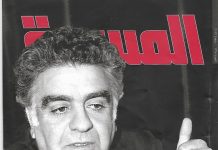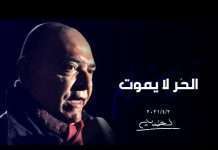The Franjieh Presidency: A Step Backward for Lebanon
Lebanese Information Center (LIC)/ December 14, 2015
Background
Since the withdrawal of Syrian armed forces in 2005, following massive demonstrations protesting the assassination of Prime Minister Rafiq Hariri, Lebanon’s political scene has been divided between the pro-West March 14 bloc and the Iranian-backed March 18 coalition. Ever since, the country has been pulled in two directions: the “Friends of Lebanon,” including the United States, European Union members and Sunni Arab states on one side, and an expanding Iranian-Syrian nexus on the other.
Since its inception, the March 14 bloc has continued to call for freedom, sovereignty, and independence in Lebanon, and has the support of many within the international community. The March 8 coalition, meanwhile, is backed by the despotic rulers of Syria and Iran, as well as Hezbollah. During an intense period of political upheaval between 2006 and 2008, Hezbollah, backed by Iran and Syria, launched a campaign of assassinations targeting elements of March 14, its sympathizers, affiliate journalists, members of parliament, and other politicians and Lebanese security officials.
This period of terror culminated in May of 2008, when Hezbollah militarily occupied Sunni neighborhoods in Beirut and Druze towns in the mountains. That same month, former Army Commander Michel Suleiman was elected President of Lebanon, with the blessing of Hezbollah and Syria’s Bashar al-Assad. But towards the end of his term, Suleiman distanced himself from both the “Hezb” and from Assad by developing a platform of national sovereignty and defending Lebanon’s independence and territorial integrity. His presidency ended in 2014, and Lebanese presidential politics have been deadlocked ever since.
The Presidential Vacuum and the Hariri Proposal
According to the Lebanese Constitution, Parliament elects the president with a two-thirds approval threshold in the first round. If no candidate wins under this stipulation, subsequent rounds are held in which the president is elected by a simple majority vote: 51%. Speaker of Parliament Nabih Berri has incorrectly interpreted the constitutional clause to enforce a two-thirds quorum just to hold a vote, which is not what the authors of the constitution intended. Essentially, this could give a one-third minority of the electoral body the power to paralyze the system until they can impose their conditions and their candidate on the majority.
In 2014, the March 14 coalition proposed Lebanese Forces Party head Samir Geagea as their candidate. March 8, meanwhile, chose to back Michel Aoun, head of the rival Free Patriotic Movement. Druze chieftain Walid Jumblatt, not affiliated with either of these coalitions, nominated Henri Helou. An election was held in April 2014 in which no candidate won two-thirds. Since then, Iran and its proxies in Lebanon have been the perennial roadblocks to realizing a meaningful presidential vote. The systematic boycott by the March 8 alliance of 32 presidential voting sessions in the past 20 months has allowed the speaker to declare “no quorum,” effectively deadlocking the process.
But in a supposed compromise agreement this November, Future Movement head Saad Hariri nominated Christian leader Sleiman Franjieh as president. The Franjiehs have close family ties to the Assads of Syria, and Sleiman had formed a close relationship with Hafez al-Assad’s eldest son, Bassel, and later with his brother Bashar. Franjieh is head of the Marada Party, which is influential in a small area in northern Lebanon. He holds extreme views, calling Hezbollah military mastermind Imad Mughniyeh a Lebanese legend and proudly brandishing his loyalty to Assad and Hezbollah.
The Ramifications of the Hariri Proposal
This proposal, evidently connived by Hariri, Berri and Jumblatt, has totally bypassed Lebanon’s Christian community and has marginalized Samir Geagea and Michel Aoun. Both Geagea and Aoun as well as several Christian independent figures have expressed their rejection of the deal.
It has also alienated many in the Lebanese Sunni community, as it would institute a president loyal to Assad, who has killed tens of thousands of Sunni Muslims in Syria. Assad is also accused of playing a major role in the assassination of Rafiq Hariri, an icon in Lebanon’s Sunni community.
Franjieh’s nomination has already sparked serious tensions in the March 14 coalition, and his election could tear the bloc apart. This coalition has united greater Lebanese society under a banner of freedom, democracy and pluralism. Franjieh’s nomination would only serve to dissolve that culture.
Franjieh as president would also be disastrous from a security perspective. As a friend of the Assad regime, he would undermine the efforts to disassociate Lebanon from the Syrian conflict and bring back the pro-Syrian officers who dominated Lebanon’s security apparatus during the Syrian occupation, jeopardizing the objectivity and the impartiality of the Lebanese Armed Forces (LAF) and Internal Security Forces (ISF). If the LAF and ISF become dominated by Hezbollah and pro-Assad apparatchiks, U.S. security assistance can no longer be tenable.
Conclusion:
Iran, Syria and Hezbollah are moving to secure their interests with a Franjieh presidency. Handing over the Lebanese presidency to an ally of Iran will only further exacerbate Sunni-Shia tensions and serve to destabilize Lebanon. Lebanese institutions and its security forces will be compromised, and the state as a whole will be weaker. Saad Hariri’s initiative has already been rejected by his allies in the March 14 coalition, and by the Christian political leadership in the country, as well as criticized by many within the Sunni community.
Moreover, this outcome will endanger US interests as well as those of allies and friends in Lebanon and the region.
The “Friends of Lebanon” – chiefly among them, the U.S. – should denounce this plan as harmful to Lebanon, the state and the nation.





















